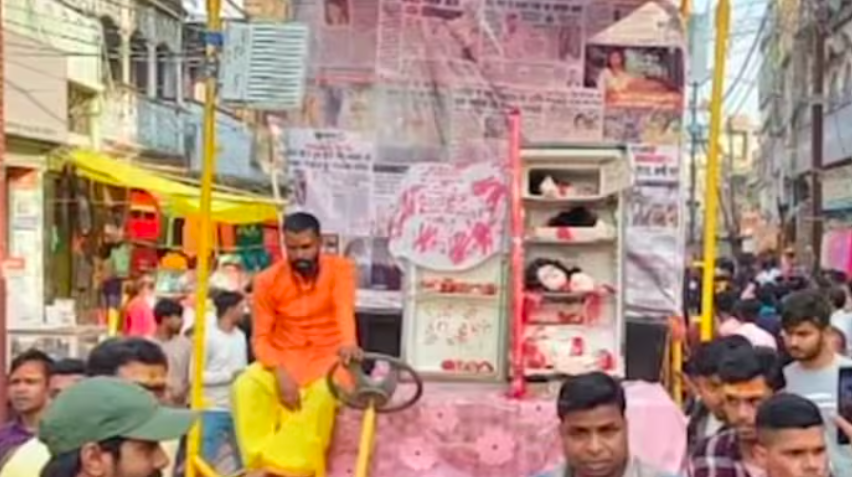We need to develop honest leaders to eradicate the current unethical practices and shall replace the unethical leaders in the future, writes Rahmath.
Mohammed Rahmath for BeyondHeadlines
In today’s competitive world, performance of an employee in Multinational Companies (MNCs) is measured in terms of various achievements and results. Internal management of an MNC evaluates the performance by these results, but they are least bothered about how these results are achieved. At the end, only “Results” matter.
Though every MNC establishes its own Code of Conduct and Ethical Policy but its application is often limited to the lower level management, and the upper management is seldom subjected to it. Using the Corporate Social Responsibility (CSR) activities, these MNCs promote their brand image in the market and get huge projects. Moreover, the association with corrupt politicians and corporate brokers would also add to their achievements. This is the crony capitalism, and it has engulfed the economic world from all directions. These MNCs control the flow of capital and funds in the world market with the help of media and other tools. Nowadays, the economic equations change in a few hours, markets collapse in just few minutes without any indications to factors, financial institutions go bankrupt leaving millions moneyless and jobless on streets.
In a developing nation like India where the corruption is reported to be very high (The Transparency International Organization has given India a rank of 84 in the corruption perception Index), the corporate organizations are more likely to be involved in unethical practices. And, it would be improper to discuss the Indian corporate environment ignoring this major factor. The issue where institutions are demanded to pay money (bribe) for any contract and license could be seen as an inevitable move in a social perspective. The 2G spectrum scam, coal scam and insider trading in stock markets (The Stock Market Scam, India in 1992) are a few examples of such unethical practices in India. The people involved in this type of cases include bureaucrats, ministers, upper and middle level management of the organizations.
The reports published on these issues highlight the reasons for highly educated officials and business magnets involving in such unethical practices to be ill conceived goals, lack of basic moral values, greed and mendacity to build vast economic empires in lesser time. The human decision-making system has blind spots like the human visual system. Ethical blind spots often obscure important aspects of an ethical decision. As a result, the person doesn’t realize that the decisions that are taken will have strong ethical implications and make unethical choices unknowingly.
Risks and Strong Contexts:
Sometimes the impossible goals, unreliable revenue forecasts, unachievable targets and high pressure at authority, peer, and government and non-government levels may push the top management personnel or senior executives in a dilemma where they make unethical choices to come out of that situation. Therefore, it could be understood that everyone involved in such unethical activities are not criminal by nature but gradually become so by falling into the dangerous trap of “Results” at any cost.
As a solution to this problem, the framing concept can be applied to try the alternative options before taking any decisions. There can be many distractions that could change one’s beliefs and values. There is a long line of research from Daniel Batson on hypocrisy, showing that people will make unethical choices in part by applying standards flexibly, until they can find a way to justify the outcome that they want for themselves.
The Pinto car launched by Ford in the year 1970, had a serious problem. The gas tank was at the rear end of the car and whenever another car crashes on the Pinto from behind, there was a high risk of gas tank rupture. So the Pinto risks exploding in a ball of fire. And everyone in the car would burn and die. Why did the management decide against fixing the problem when it would have saved lives? It was not worth investing in a reduction in the explosion risk from the perspective of a cost-benefit analysis. The Pinto story has become a symbol of the cold-hearted profit maximization attitude of companies who make, try to make money at any price even if human life is at stake. In this team one call back coordinator at Ford was Dennis Gioia, who later became a famous management professor who later writes down a story of his experience when he was an engineer at Ford in the call back team.
“After I left Ford I now argue and teach that Ford had an ethical obligation to recall. But while I was there, I perceived no strong obligations to recall and I remember no strong ethical overtones to the case whatsoever. Or, why didn’t I see the gravity of the problem and its ethical overtones? What happened to the value system I carried with me into Ford? “–This is a typical case of ethical blindness. The people with moral values, against corporate materialism and aggressive war languages, could be suffered with ethical blindness. Either it might have happened for abandoning the values and principles in which they used to believe.
Defense Strategies & Activities:
Professionals should stand against such unethical practices and unethical decisions. One way could be by making tough strategies that blocks such practices. Another way could be by promoting the social awareness, moral values and ethical principles among professionals. In addition, the ethical standards should be integrated in every work location and corporate environment.
Are we publicly describing our own growth as an ethical person? If we are not willing to discuss the process of learning about our own blind spots, no one else will be either.
Though the issue which is discussed here is specific and challenging but it will not make any hindrance in practicing ethical values. To defend such wrong practices and unethical decision making we need a change in the current society. We need to revise or correct the reward systems that lead to ethical fading and motivated blindness. Through gradual change in the wrong beliefs we can stop the future tragedies like NASA, Ford Pinto and many other bankrupts. We have to be courageous enough to blow the whistle and to fight such unethical practices.
The two brave men Julian Assange of WikiLeaks and former National Security Agency (NSA) contractor Edward J. Snowden are the whistle blowers of the current generation. We should take them as role models and try to defend the unethical practices in any organization.
We must determine to facilitate better awareness of ethical practices and decision making in organizations, communities and the society. We need to develop honest leaders to eradicate the current unethical practices and shall replace the unethical leaders in the future. A single professional individually can bring a big change in the society
[The author is associated with Tata Consultancy Services (TCS). Views expressed here are personal, and may not necessarily reflect opinion and facts of/about others.]
References:
Ford-Pinto:
Dowie, M. (1977). Pinto Madness. Mother Jones, 128, 18-32. Accessible at: http://www.motherjones.com/politics/1977/09/pinto-madness.
Gioia, A. G. (1992). Pinto fires and personal ethics: A script analysis of missed opportunities. Journal ofBusinessEthics, 11,379-389.
Lee, M. T., & Ermann, M. D. (1999). Pinto “Madness” as a Flawed Landmark Narrative: An Organizational and Network Analysis. Social Problems, 46(1), 30-47.
Ethical Blindness:
Palazzo, G., Krings, F., & Hoffrage, U. (2012). Ethical blindness. Journal of Business Ethics, 109(3), 323-338. Accessible at: http://link.springer.com/article/10.1007%2Fs10551-011-1130-4
NASA Tragedy:
Space Shuttle Challenger disaster. (2014, October 20). In Wikipedia, The Free Encyclopedia. Retrieved 15:23, October 21, 2014, fromhttp://en.wikipedia.org/w/index.php?title=Space_Shuttle_Challenger_disaster&oldid=630389304 Feldman, S. P. 2004. The culture of objectivity: Quantification, uncertainty, and the evaluation of risk at NASA. Human Relations, 57, 691-718.
The Ideological Power of Capitalism
Friedman, M. 1970. The social responsibility of business is to increase its profit. New York Times Magazine, September 13. Free access at:http://www.colorado.edu/studentgroups/libertarians/issues/friedman-soc-resp-business.html
Videos:
Milton Friedman on the Ford Pinto story: https://www.youtube.com/watch?v=jltnBOrCB7I
In this short video clip (6:56), Friedman takes the challenge of a student who argues that Ford’s decision not to recall the Pinto was unethical
Critical video on capitalism (Four Horsemen): https://www.youtube.com/watch?v=5fbvquHSPJU
This multiple- award winning feature documentary by Ross Ashcroft sheds a critical light on the current Western societal, economic, and monetary system (1:38:53)
Video of the story of stuff: http://storyofstuff.org/movies/story-of-stuff/
This video, written by Annie Leonard and Jonah Sachs, takes a fast-paced, fact-filled look at the underside of our production and consumption patterns (21:24)
2G Spectrum Scam:
http://en.wikipedia.org/wiki/2G_spectrum_scam
The Coal Scam:
http://en.wikipedia.org/wiki/Indian_coal_allocation_scam
The Stock Market Scam (1992):
The Transparency International Corruption Index (India):
http://www.transparency.org/cpi2014/results
http://issuu.com/transparencyinternational/docs/2014_cpibrochure_en/3?e=2496456/10375453
How to Protect Organizations against Ethical Blindness:
The power of storytelling – Guido Palazzo’s TEDx talk, March 2014: https://www.youtube.com/watch?v=j7c9b9A2AHc
Ancona, D. (2012). Sensemaking: Framing and acting in the unknown. The Handbook for Teaching Leadership: Knowing, Doing, and Being, 3-21. Thousand Okas, CA: Sage.









